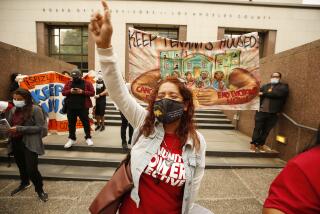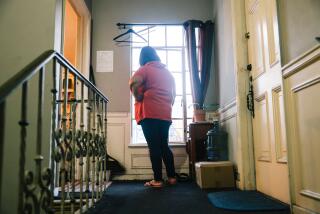South African Family Finds Nightmare in ‘American Dream’ : Loan: Wife of exiled couple says Michael Henschel swindled them out of their house, but he denies any misdeeds.
- Share via
When Mazisi and Mathabo Kunene, exiled leaders of South Africa’s African National Congress, arrived in Los Angeles 20 years ago, they never imagined the new battle that awaited them.
Seeking a loan a few years ago to clean up debts and pay for their children’s schooling, the Kunenes say they fell into the clutches of Michael D. (Mickey) Henschel, a Van Nuys loan broker and real estate man who promised to help, but allegedly swindled them out of their house.
Mathabo Kunene’s battle to save her View Park home echoed all the way to Congress, where she testified about her years-long struggle.
“We did not come from South Africa . . . to the United States and try and create a life for our children, only to be cheated by Michael Henschel,” Mathabo Kunene said.
But that is what happened, she says.
Nobody could have convinced Kunene that the system here would be so ineffective in her effort to save her house, or that others languished in the same situation.
Henschel tried to warn her, she said, when she announced her plans to sue him.
“He laughed in my face,” Kunene said in her testimony before a congressional committee. “His response was, ‘Mrs. Kunene, you don’t understand how things work in the United States. The courts will delay you for five years, the lawyer will eat your money, and you will come crawling back to me.’ He was right on two counts.”
The Kunenes eventually got their house back--but they faced a huge legal bill. And, in a bitter irony, the house ended up in the hands of the Kunenes’ former attorney, who had placed a lien for unpaid legal bills on the property he was hired to help save. The attorney foreclosed earlier this year--right before the Kunenes moved back to South Africa to participate in that nation’s renewal.
“It was the end of a very sad story of how white-collar crime invades the family,” Kunene said. “We were honest taxpayers in this country. . . . It was incredible, and all of the [governmental] agencies were virtually helpless.”
The Kunenes now live in Durban, South Africa, but Kunene’s advocacy work and their case still reverberate.
“I’m sorry she left,” said Ronald Kaye, an attorney with the Legal Aide Foundation. “Mathabo was organizing people in South-Central, letting them know we have to organize and fight this plague.”
The Kunenes lived on Chanson Drive in a quiet, middle-class community. Mazisi Kunene, a renowned poet, taught African literature and languages at UCLA. Over the years, their house became a haven for South African students and other exiles, a place where they could find warm meals and communion.
Their story began in 1988, when the Kunenes sought to borrow against their home to clear up debts, pay tuition for their children and launch a catering business. After being turned down by a bank, they were introduced to Henschel, who offered to secure a loan on favorable terms.
According to the Kunenes’ lawsuit, Henschel falsely claimed to be a real estate broker. He instructed them to deed him the house, promising to arrange the loan, take a 1% commission, then deed the house back.
But according to the lawsuit, the Kunenes never got about $32,000 in cash they were promised by Henschel. Moreover, they claimed, Henschel did not deed back the property for several months, by which time he allegedly had encumbered it with additional loans that the Kunenes did not authorize.
In addition, the Kunenes said, they made several loan payments to Henschel that never reached the bank. When the Kunenes stopped paying, one of Henschel’s business entities initiated foreclosure proceedings.
In an answer to the lawsuit, Henschel denied all allegations of wrongdoing. He did not respond to The Times’ requests for an interview.
The Kunenes had been introduced to Henschel by two friends, James and Tish Coblentz, for whom Henschel had also arranged loans. Like the Kunenes, the Coblentzes said they, too, later realized they had been conned and sued Henschel for fraud.
“We’re the ones who turned the Kunenes on to Mickey,” James Coblentz said. “I feel like a real schmuck.”
Kunene launched a massive assault. She wrote a flurry of letters to everybody from the mayor to the FBI, and the state Department of Real Estate. She staged a demonstration in front of Henschel’s Victory Boulevard office. She circulated petitions.
Meanwhile, the lawsuit dragged its way through court.
Angry and dissatisfied with her attorney, Kunene did her own digging at the county courthouse and recorder’s office. She discovered dozens of lawsuits against Henschel, as well as criminal convictions.
“If the bank could turn me down and then do business with somebody who has such a checkered past, then something is wrong,” Kunene said. “They create a vacuum that’s filled with people who are crooks . . . who slide a note under your door and the next thing you know you’ve signed away your house.”
In her efforts to save her own house, she became an expert of sorts, following the cases of victims, calling on officials to address the issue of fraud and its impact--particularly on the African American community.
“There is no point in our black representatives trying to improve the quality of life for African Americans if there’s going to be this major drainage through home equity fraud,” Kunene said. “This is devastating our communities.”
One year she helped organize a forum with the office of state Sen. Teresa Hughes (D-Inglewood) at Los Angeles Southwest College that was attended by more than 200 people.
*
During this period, the Kunenes managed with the help of neighbors who sometimes dropped by with boxes of food, and paid her way to testify before a congressional committee, Kunene said. When it was time for their daughter to start her freshman year at Brown University, she did it without the help her family might have been able to provide.
“It was a nightmare,” Kunene said. “We couldn’t even get a loan because of all this.” The children--including a teen-age son and twin boys--knew full well that homelessness was a nagging threat, she said.
“What really hurt me is that my kids felt it so deeply,” she said. “It affected their grades. You live on this seesaw. Are we going to lose the house today?”
The turning point in the Kunenes’ case came in 1993, when Kunene sought help from Public Counsel, an agency in Los Angeles that arranges free legal representation for low-income individuals. She was dissatisfied with their first attorney and he no longer represented them. Elisabeth Hunt, an attorney with Milbank, Tweed, Hadley & McCloy, a prestigious mid-city law firm, took on the case.
Much of the information dug up by Kunene proved helpful in prosecuting the case, Hunt said.
Hunt worked out a settlement with several defendants in the lawsuit, including a title company, several Henschel family members and Cloverdale Associates, a Henschel business entity.
Between them they paid more than $16,000, and Cloverdale reconveyed a deed of trust it had on the property.
Then last July, they reached a settlement with Michael Henschel, who agreed to remove two more trust deeds on the property and pay $3,000 in monthly installments of $250.
In the time it took to get their house back, Nelson Mandela was freed from prison, apartheid was laid to rest and free elections were held for the first time in the South Africa’s history.
“I cried and I cried and I cried when [the settlement] came out,” Kunene said. “This was a testament to six years of work.”
But Henschel allegedly has failed to keep his end of the deal. “The long and short of it is he never made a single payment,” Hunt said.
At Kunene’s request, Hunt did not pursue it further. “Mathabo was in the process of moving and trying to get on with her life,” Hunt said. Kunene suggested that the attorney’s time might be better spent helping someone else.
Though her victory was dubious, there was value in the struggle, Kunene said.
“I stood up to Michael Henschel,” she said. “I know he’ll never forget that.”
The Kunenes’ first attorney maintained that they owed him $67,000. They argued that he mishandled the case and have filed a claim with the State Bar Assn. That case is pending. To satisfy a settlement of $20,000, the lawyer foreclosed on the house.
“The American Dream states that if you work hard enough in the land of opportunity, all things are possible,” Kunene said. “Well, we worked hard and bought a home . . . but no one warned us of the dark side of the American Dream or what I have come to call America’s shame.”
More to Read
Sign up for Essential California
The most important California stories and recommendations in your inbox every morning.
You may occasionally receive promotional content from the Los Angeles Times.










